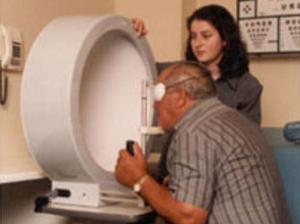BOOK ONLINE NOW
After a brain tumour, brain injury or stroke, patients may lose part of their visual field, a condition known as Hemianopia.
In Hemianopia, damage affects the signals that are sent from the eyes to the brain via the optic nerve pathways.
Quality of life is dramatically reduced with Hemianopia, as the individual may no longer be able to read, watch TV, or drive a car. Their mobility is also compromised as they have difficulties in seeing potential obstacles in their path.
For some people, Hemianopia may be temporary and improve after some months, for others the change is permanent.
Eye movement therapy is the most common rehabilitation therapy offered in Australia for homonymous hemianopia (HH).
However a more recent development is the wearing of peripheral prism glasses, first described in 2000 by Eli Peli, an American expert in vision rehabilitation research. Not surprisingly, these are now known as Peli prisms.
Peli prisms work by shifting the image from the ‘blind’ side to the other side so the wearer sees a super-imposed image, and this helps with detecting movement and contrast from the missing field of vision. Being able to notice and avoid obstacles helps to reduce the risk of falls and improves mobility.
In one study, horizontal peripheral prisms were placed above and below the line of sight in one lens in the individual’s ‘blind’ side; the middle of the lens was unobstructed, expanding horizontal peripheral vision by about 30° (1).
Prism inserts may be temporary add-ons or they can be embedded in spectacle lenses, for more a permanent and durable solution.


While wearing prismatic correction glasses may expand the vision field, it does takes time and practice to adapt and interpret the way images are presented.
Peli Prisms may be trialled for a period of up to six months, and if the individual finds them helpful, the optometrist can provide permanent glasses fitted with the Peli lens.
Peli lenses may be obtained under NDIS funding for some patients.
To find out if Peli lenses may be suitable for you or a family member, please book an appointment at our Alexandra Hills optometry practice.
References:
© 2026 Aphrodite Livanes Optometrists Alexandra Hills Brisbane. All rights reserved.